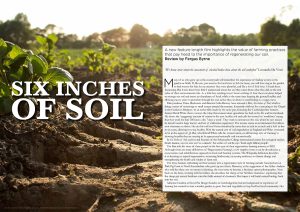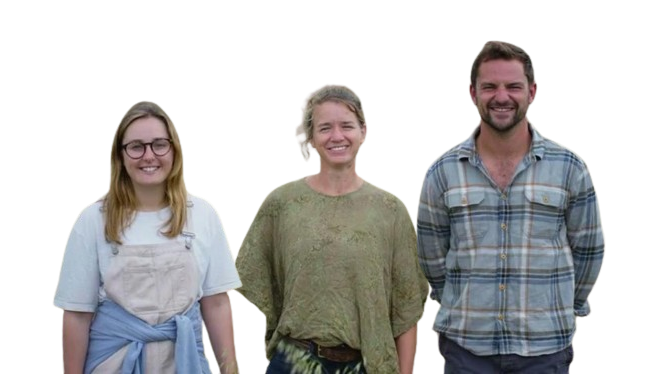A new feature length film highlights the value of farming practises that pay heed to the importance of regenerating our soil.
Review by Fergus Byrne
“We know more about the movement of celestial bodies than about the soil underfoot” Leonardo Da Vinci

Many of us who grew up in the countryside will remember the experience of finding worms in the garden or fields. If, like me, you went to the local river to fish for trout, you will have dug in the garden to find worms for bait. In my memory they were plentiful, and like a lot of little boys I found them fascinating. But I now know how little I understood about the soil they came from; what they did, or the real value of their environmental role. As a little boy catching trout I knew nothing of how these creatures helped to manage our soil and create an abundance of food, while at the same time keeping the ground healthy and allowing excess water to percolate through the soil, rather than sit above it contributing to a soggy mess.
Film producer Claire Mackenzie and director Colin Ramsay have released a film, Six Inches of Soil, which is doing a series of screenings at small venues around the country. It recently sold out for a screening at the Chapel in the Garden in Bridport. In an earlier film made by the same pair, featuring five Cambridgeshire farmers, farmer David White shows viewers the value that conservation agriculture has had on his life and his farmland. He shows the ‘staggering’ amount of worms in his now healthy soil and calls his worms his ‘workforce’ saying that they work for him ‘24 hours a day 7 days a week’. They work to restructure the soil, which he says means he doesn’t need a huge tractor and lots of cultivation equipment. The worms create an environment that allows root structures to thrive. He says his soil hasn’t been disturbed by more that an inch to an inch and a half in five to six years, allowing it to stay healthy. With the annual cost of soil degradation in England and Wales estimated to be in the region of £1.2bn, what David White calls his ‘conservation, no till farming style of farming’ is showing benefits that are starting to be appreciated nationally and internationally.

In Six Inches of Soil, activist and founder of the Schumacher College international center for ecological studies, Satish Kumar, says he sees soil ‘as a miracle.’ Six inches of soil he says ‘feeds eight billion people’.
The film tells the story of three people in the first year of their regenerative farming journey in 2022. Although there are many definitions of ‘Regenerative Farming’, in it’s simplest form it can be described as a conservation and rehabilitation approach to food and farming systems. The Wikipedia definition describes it as focusing on topsoil regeneration, increasing biodiversity, increasing resilience to climate change and strengthening the health and vitality of farm soil.

The three farmers embarking on their journey into a regenerative style of farming include Anna Jackson at Pink Pig Farm in North Lincolnshire who grew up on a farm. However, at the suggestion of her father Andrew who told her there was no money in farming, she went away to become a freelance sports photographer. Now back on the farm, working with her father, she describes her sheep as her ‘fertilizer machines’, explaining that the sheep put natural fertilizer onto the fields instead of chemicals. She hopes it will build natural biology back into the soil.
Adrienne Gordon at Sweet Pea Marget Garden in Cambridgeshire had no background or experience of farming but wanted to start a market garden to grow fruit and vegetables to hep feed her local community. Her efforts bring a smaller scale business to the story where she sees her products as attracting a niche market. She describes her venture as the realization of all her dreams.
At Treveddoe Farm in Cornwall, Ben Thomas, the third person featured in Six Inches of Soil looks after two herds of belted Galloways. He had never doubted that he would do anything else. He says he was ‘obsessed’ with cattle as a child. His goal at Trevedoe is to produce the best beef as ethically as possible and to regenerate the soil on the farm that he rents.
Six Inches of Soil makes a point that has been made by many people in many formats over recent years but it is a point that we need to keep making until more people are able to change their farming strategies.
It’s not an easy solution. Farming, whether traditional, regenerative or organic is not an easy way to make a living. Farmers spend many solitary hours in fields and sheds across the country, battling as much with unpredictable weather conditions as with rules, regulations and the pressure to make a living—while at the same time being pressed by advice from many directions, including from those with their own financial agendas. What many people outside the industry see as damaging traditional practices aren’t always the farmer’s choice. Every real countryman or woman will look after their land if they possibly can.
However, following the efforts of these three different farming initiatives, Six Inches of Soil brings home the importance to all of us of what direction farmers and smallholders take when planning the future of how they will farm their land.
Setting the scene using an animated sequence to describe the history and development of farming, actor David Morrissey voices a fascinating introduction to where we are today. He points out that ‘It takes thousands of years to transform rocks, water and dying plants into biologically active soil—it’s fertility, however, can be lost in mere decades.’
The sequence goes on to explain how American agronomist Norman Borlaug created new breed’s of high yielding cereal crops that transformed farming. Synthetic fertilizers, pesticides and government subsidies increased yields, and although for a time farmers became heroes—helping to feed an ever growing global population—the processes came with huge hidden costs. Heavy machinery replaced people and a hunger for cheap meat and dairy intensified livestock production, pouring effluents and chemicals into our streams and rivers. Ploughing by enormous tractors degraded and compacted soil which eroded and washed away into our rivers and seas. These practices became widespread and as a result Britain is seen as one of the most ‘nature depleted’ countries on earth.
However, the joy of Six Inches of Soil is not it’s purveyance of doom and gloom, it is the fact that it’s focus is on a way forward. The three farmers featured in the film are looking at regenerative agricultural practices. ‘Regenerative agriculture is a suite of farming practices that rebuild soil, organic matter and restore biodiversity’ says the voiceover. ‘This is part of a growing movement of agro ecological farmers and food producers who are rejecting the industrial model. Choosing to work with nature, not against it.’ The sequence ends with the words. ‘Now is the time to reimagine our relationship with the soil, to recognize how it feeds us, protects us and sustains us. We need to hold the living soil in our hands and feel the earth beneath our feet once more.’
That might be where you would expect the film to end, but it’s just getting started. Our introduction to, and emotional interaction with the main characters personalizes what might have become a well worn trope. Andrew and Anna Jackson’s father and daughter banter, Adrienne Gordon’s determination and occasional bewilderment, and Ben Thomas and his partner Claudi’s efforts take us on a journey that shows both the difficulties and the benefits of regenerative farming.
The film is also liberally scattered with comment from a range of experts including British activist and speaker Satish Kumar; Co-founder of the Leon restaurant chain, Henry Dimbleby; Professor Emeritus of Food Policy at City University of London, Tim Lang and Hannah Jones, farm carbon and soils adviser with the Farm Carbon Toolkit. There are many more voices also that offer observation and advice.
Regenerative farming practices are crucial for preserving soil health, addressing climate change, and promoting biodiversity. Speakers highlighted the significance of quantifying organic matter levels in soil, using no-till drills, and understanding the history of a farm and its ecosystem.
However, as we have all learned, what is best for us or our planet doesn’t necessarily motivate everyone. Satish Kumar says: ‘We have come to believe that money is more important than soil, and money is made by industry, by manufactured goods. So we are prepared to pay lots of money for cars, computers, houses, airplanes, everything else—but food must be cheap. That idea has to change.’
Standing in the family farm’s grain store Anna Jackson points to the 200 tonnes of ‘Regen’ wheat they have harvested. She is proud that they have used half the amount of chemicals to achieve the yield and that every year they are reducing their chemical inputs. ‘It just makes me feel wholesome’ she says. She finds it hard to describe the ‘full amount of happiness that farming in an environmentally friendly way’ brings her. ‘It just makes sense to me, like I just feel like everybody should be doing it. I don’t understand why everybody’s not.’
With perhaps one of the most powerful and poignant comments in the film she says: ‘Dad started Regen farming—not for him, he did it for me. Like he did it for the future generations to come. And that was the most selfless act he could have done on this farm. And I’m now carrying on that tradition and we’re getting greener and greener every year, for generations to come.’
Regen farming is unlikely to be the only way that all farming will progress in the immediate future. But those that follow it’s practices now will be attempting to lay the groundwork for future generations of farmers and also for those that realize the true value of the earth we walk on.
To arrange a screening or to learn more about Six Inches of Soil visit: https://www.sixinchesofsoil.org/



